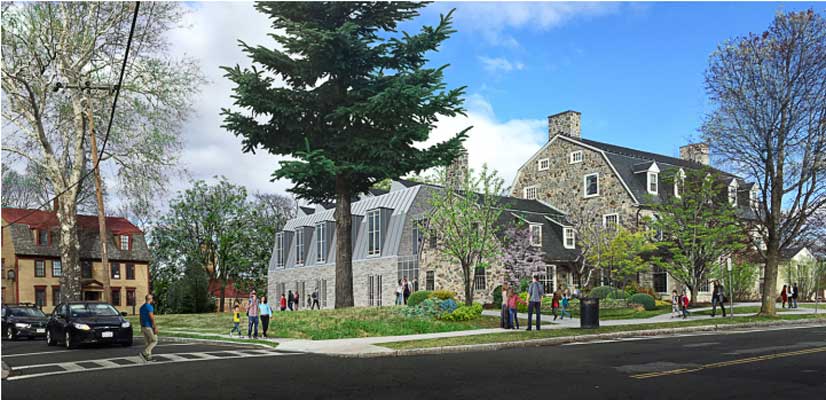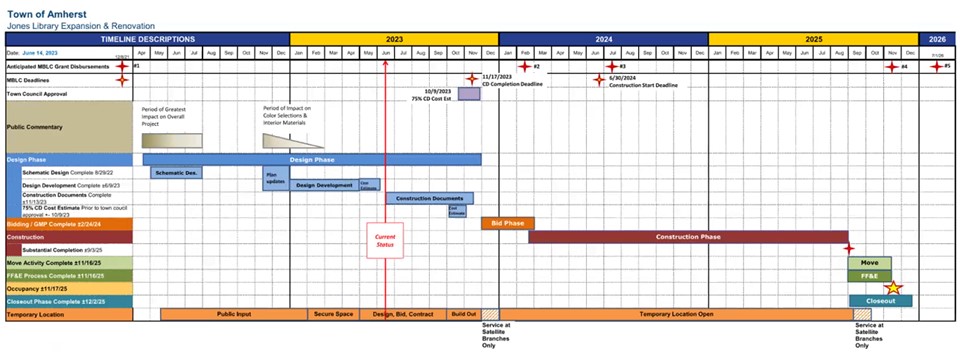Failure To Hire Quality Assurance Lead Raises Troubling Questions For Jones Library Project

Photo: https://www.joneslibrary.org/
Town Misses January Target To Name State Mandated Commissioning Agent
Recent elimination of sustainability features and under-the-radar plans to bypass a new state energy code have generated concerns over the Jones Library Renovation-Expansion Project team’s willingness to cut corners and turn a blind eye toward promised deliverables in the interest of closing a nearly $10 million budget gap.
The Amherst Indy has learned that a Request for Proposal (RFP) issued by the Town in December 2022 for commissioning agent services has resulted in only one bid, and that was by Colliers, the firm acting as Owner’s Project Manager (OPM), and who wrote the RFP.
Town of Amherst Procurement Officer Simone Cristofori has reported that an RFP solicitation was sent to Colliers Engineering and Design, BVH Integrated Services, and Consulting Engineering Services. Only Colliers responded with a bid. Because a contract has not yet been signed, Cristofori explained that the Colliers bid is not subject to a Public Record Request.
At the December 1, 2022 meeting of the Jones Library Building Committee (JLBC) Amherst Finance Director Sean Mangano described enlisting a commissioning agent as,
“hiring the consultant who will evaluate all the systems and all the promises we make in terms of the efficiency of the building and the outputs of the building to make sure that the final product actually delivers everything that we’re promising. So in our conversations with Craig [former OPM Craig DiCarlo of Colliers Project Leaders] it’s standard to bring those people in at the design phase so that they can help fully understand what’s being put in, maybe advise on some things, and then that puts them in a much better place to evaluate them at the end when the building opens up.”
OPM Craig DiCarlo described the budget line item for commissioning as being “a little bit light — we have $80,000 earmarked for that. We’re anticipating it is going to be a little more than that — possibly twice as much as that.”
The Town’s RFP solicitation asked for proposals to be returned by January 13, 2023 at the beginning of the project’s Design Development (DD) Phase. DD has now been completed with no commissioning agent contracted.
The Massachusetts code that regulates state library construction grants, 605 CMR 6.00, defines commissioning as
“A quality assurance program intended to demonstrate that a building is constructed well and performs as designed.”
The regulation specifies that
“The commissioning agent is responsible for coordinating and carrying out the commissioning process and should be brought on during the design phase. The commissioning agent shall be an independent party, not affiliated or associated with the owner’s project manager, designer, contractor, any subcontractors, or CM at Risk, to provide commissioning services with the intent of achieving, verifying, and documenting the performance of building systems in accordance with the design intent and the functional and operational needs of the library.”
The DD Phase of the library project which saw intensive “value engineering” decisions made to reduce costs by eliminating design features was completed in June without a commissioning agent having been hired.

By contrast, Amherst’s concurrent Fort River Elementary School Building Project and its grant awarding agency, the Massachusetts School Board Authority (MSBA) have taken the installment of a commissioning agent seriously. The MSBA has named VanZelm Heywood and Shadford as commissioning agent while the School Building Committee works on tightening, modeling and evaluating the building envelope during the design phase in order to assure compliance with the 2023 Massachusetts stretch energy code.
Who’s Minding The Store?
The topic of commissioning agent services has not been discussed by the Library Building Committee since February 2023. On February 2 Mangano reported that,
“We are still evaluating commissioning proposals that we received and working with [designer] FAA about analyzing different variations of commissioning services that we could bring on.”
Disregarding state library grant regulations, the Colliers OPM DiCarlo advised that commissioning during the design phase was “optional” according to building codes. Mangano explained that “there’s some [commissioning] pieces that aren’t required and [we’re] looking at how it all fits within our budget.”

I believe that this is known as the fox minding the henhouse.
Perhaps more troubling is the speculation that many reputable consultants would prefer not to work in Amherst. If I’m remembering correctly, back in the 2010s, when Amherst was looking for a consultant to do a market-rate housing study, and offering about $40,000 for the project, they only got one or two responses to the RFP. The firm that ended up doing the study was RKG Associates, out of Alexandria, Viriginia. I remember reading through the draft report during some downtime while I was working in the emergency department, and being flabbergasted but unable to express my disbelief as I read about”regional migration trends” and “migrants in the 18 to 24 cohort.” Of course, these were the same folks who brought us the “Laptops and Lattes” descriptor — one of 100 or so cutsie names to describe the “tapestry” of lifestyles in the US, courtesy of Esri. Even the town found the report, which clearly indicated little on-site investigation or knowledge, to be unacceptable, and sent it back for revisions. It may be that Amherst’s reputation is such that it has trouble attracting those consulting firms that would give the town useful and workable information.
Add this lack of a Commissioning Agent and ignoring of the fact that the building will have to be redesigned to meet the new Energy Stretch Code to the list of troubling aspects of this project.
Looking at the schedule posted above, it seems they are halfway through “Design, Bid, Contract” for the numerous temporary locations where the library would be while the Jones would be closed to the public.
Have any contracts been signed with the landlords of those properties, or with contractors who would do the design and build out of the properties that need a lot of modifications before they would be ready to house library functions?
Trustee Bob Pam asked about this in a meeting a while back: How can they move forward with these financial obligations and preparations to move everything out of the library if they don’t yet know if the project is a go or not?
Also looking at the Bid Phase on the timeline, it seems like a construction contract would be signed in February 2024. Paul Bockelman has said many times before that he cannot sign a contract with a construction firm until ALL of the funding is approved. As far as I know, ~$36 million has been approved, but the project is now estimated at something like $46 million. There is still a many-million dollar hole in the fundraising. The fundraisers have had seven years to raise money for this project and I don’t think they have yet reached the first target, which is many millions less than the current target. Is it magical thinking that they will have raised another, what, $10 million by February of next year?
When is the right time for the Town Council to vote on approving (or not) the higher estimate? [Of course bids may come in higher again and another supplementary appropriation vote would be required.]
Will Councilors hold fast to the promise that the town will give $15.8 million to this project and not a penny more? What then if the money raised is millions shy of the target? Will taxpayers be on the hook for the shortfall as well as all the interest on the full amount borrowed?
Also, the Memorandum Of Agreement between the Library Trustees and the Town seemed to commit that fundraising expenses for the project could be deducted from the library’s share of the project. Does this mean that taxpayers are paying for the professional fundraisers hired for this project as well as the flyers and promotional videos and the like? Last I saw the fundraising expenses to date were almost $200,000. It is my opinion that that amount should be added to the library’s share or deducted from the town’s $15.8 million share. The school project doesn’t have the benefit of professional fundraisers out scouring for federal and state grants to lower the cost to taxpayers.
Jeff Lee, thanks for the morning chuckle and head shake from the comment by Jones Library OPM Craig DiCarlo describing the commissioning budget as “a little bit light” when in fact, the needed funds may be “possibly twice as much as that.” How many of us would justify pursuing a home renovation project while continually underestimating what the real costs are. The Jones Library expansion project continues to run significantly over-budget and limps along by cutting corners on its sustainability promises, with only the marketing hype keeping this bloated project afloat.
Just wait a bit longer, as the legal fees for the City known as the “Town of Amherst” begin to mount, overwhelming any imagined “savings” in not appointing a Commissioning Agent.